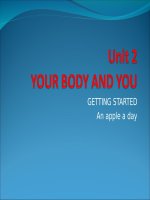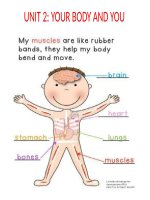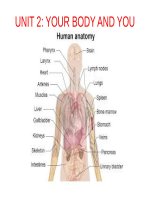- Trang chủ >>
- Đề thi >>
- Đề thi lớp 3
Unit 6 Viet Nam Then and now Lesson 1 Getting started
Bạn đang xem bản rút gọn của tài liệu. Xem và tải ngay bản đầy đủ của tài liệu tại đây (3.93 MB, 71 trang )
<span class='text_page_counter'>(1)</span>Look at the pictures and guess the main topic of the following pictures..
<span class='text_page_counter'>(2)</span>
<span class='text_page_counter'>(3)</span> Answer the following questions: IsWho therecan anything thein small on you in see the pictures picture? the wall related to think past and present? Where do you they are?.
<span class='text_page_counter'>(4)</span> 1. Listen and read. Duong: Can you believe it’s the school’s 60th anniversary? Phuc: I know! I really like the photo exhibition. It’s fascinating to see how the school used to look. Duong: Right! The photos explain a lot about our school in the past..
<span class='text_page_counter'>(5)</span> • Tom: Look – these two pictures were taken in 1970. Phuc: Wow, that long ago? The school looks more like thatched houses with paddy fields all around. You can see there were only a few classrooms and the walls were made of mud and straw and, look – trenches!.
<span class='text_page_counter'>(6)</span> • Duong: I think that was during the war so it was necessary to have the trenches right there. Tom: Ha… the students in this picture are wearing rubber sandals and straw hats..
<span class='text_page_counter'>(7)</span> • Nhi: Hey, and these pictures were taken in 1985. Look at the broken tiled roof and wooden window frames… and some of them are missing. • Duong: Yes, I can’t imagine how those students could study in such poor conditions!.
<span class='text_page_counter'>(8)</span> Phuc: Right! Things have improved considerably now. We have everything… comfortable classrooms, learning facilities like computer rooms… Nhi: Yeah, we also have nice uniforms and proper shoes. We’re much luckier these days… But, I’m not sure our grades are better….
<span class='text_page_counter'>(9)</span> 1a. Put a word/phrase from the box under each picture. thatched house trench. facilities rubber sandals. 1. trench. 2. tiled roof. 4. photo exhibition. 5. rubber sandals. tiled roof photo exhibition. 3. 6. facilities. thatched house.
<span class='text_page_counter'>(10)</span> 1b. Find a word in the conversation that means:. 1. celebration of an important year 2. very interesting 3. not there 4. situations 5. got better 6. real. = anniversary = fascinating = missing = conditions = improved = proper.
<span class='text_page_counter'>(11)</span> 1c. Read the statements and decide whether the information is true (T) or false (F), or not given (NG). Statements 1. The school was founded at the beginning 1. The school was founded in the 1960s. of the 20th century. 2. The school was initially surrounded by paddy fields. 3. During the 3. During the 1970s, 1970s, the the students students were wore well dressed. rubber sandals and straw hats. 4. The students in the 1980s learnt better than in the 1970s. 5. The school now is much better equipped.. T. F. NG. √ √ √ √ √.
<span class='text_page_counter'>(12)</span> 1d. Read the conversation again and answer the questions. 1. When does the conversation take place? - The ____________________________________________ conversation takes place on the school’s 60th anniversary. 2. Why does Phuc say the photo exhibition is fascinating? - Because ____________________________________________ it explains a lot about how the school was in the past. 3. What was unusual about the school in 1970? - There ____________________________________________ were trenches outside the classrooms. 4. How was the school in 1985? - The ____________________________________________ roof was made of tiles and some tiles were broken. The window frames were made of wood and some of them were missing.. 5. What can the students learn from the photo exhibition? - They ____________________________________________ can learn that they are lucky to have such great learning facilities nowadays..
<span class='text_page_counter'>(13)</span> Remember! When we want to describe changes, we can use adjectives to modify nouns and adverbs to modify verbs:. Adjectives dramatic considerable significant slight gradual. Adverbs dramatically considerably significantly slightly gradually. Example: -There have been changes considerable in the last decade. -Our environment has been gradually polluted..
<span class='text_page_counter'>(14)</span> 2. Complete each sentence with a word from the REMEMBER! box which has the same meaning as the words in brackets.. 1. There have been _____________ differences in the slight country’s policies as compared to two years ago. (minor) 2. The traffic system in Ha Noi has been _____________ dramatically upgraded over the last ten years. (suddenly and to a great degree) 3. Vietnamese people’s lives have been _____________ significantly improved. (enough to make a difference) 4. There have been _____________ considerable changes in the way people work. (quite large) 5. There has been a ____________ increase in people’s gradual income over the last ten years. (little by little).
<span class='text_page_counter'>(15)</span> 3. Interview your teacher about the features of your school when she/he started teaching here. Then use the information provided to talk about the changes to your school.. You can talk about: + the school principal and school teachers + the school playground + the library + the computer room + the classroom.
<span class='text_page_counter'>(16)</span> Homework • Learn new word by making some sentences • Prepare “A Closer look 1”.
<span class='text_page_counter'>(17)</span>
<span class='text_page_counter'>(18)</span> 1. Put one word/phrase under each picture. underpass elevated walkway. flyover tunnel. skytrain tram. 1. tram. 2. flyover. 3. elevated walkway. 4. skytrain. 5. underpass. 6. tunnel.
<span class='text_page_counter'>(19)</span> 2. Fill in each blank with a suitable word 1, making them plural where necessary. underpass elevated walkway. flyover tunnel. skytrain tram. 1. Hai Van ___________ is 6.28 km long. tunnel 2. Thanks to the _______________, elevated walkway pedestrians can be much safer. 3. A ___________ is a bridge that carries one road over flyover another one. 4. The railroad track that runs overhead is known as a ___________. skytrain 5. A road or path that goes under another road or railroad track is called an ___________. underpass 6. The clanging sound of the Ha Noi ___________ in the tram 1970s has gone deep into people’s collective memory.
<span class='text_page_counter'>(20)</span> 3. Match each word/phrase in the left column with the definition in the right one. Word/phrase. Definition. 1. extended family. a. parents and children living together as a family unit. 2. tolerant. b. able to accept what other people say or do even if you do not agree with it. 3. cooperative 4. sympathetic. c. willing to do what you are told to do d. kind to somebody who is hurt or sad; showing that you understand and care about their problems. 5. obedient. e. working together with others towards a shared aim. 6. nuclear family. f. more than two generations living together as a family unit.
<span class='text_page_counter'>(21)</span> 4. Fill each gap with a word/phrase in 3. extended family. tolerant. cooperative. sympathetic. obedient. nuclear family. 1. Our grandparents used to live in an ___________. extended family 2. My mother is a ___________ sympathetic woman. She always cares about how we feel. 3. The boys are willing to do what you want them to. They are really ___________. obedient 4. She is ___________ with her children even when tolerant they misbehave. 5. Nowadays the ___________ nuclear family is becoming more common in the cities. 6. Having students work in groups, she hoped they could learn to be ___________. cooperative.
<span class='text_page_counter'>(22)</span> Pronunciation Stress on all the words in sentences. Typically, a sentence has one word or syllable that is stressed more strongly than the rest of the stressed syllables on the content words. However, in some sentences used to show urgency or surprise, all the words are important. Therefore, we put stress on one syllable of each word. Sentences with all the words stressed may have the patterns below: OO Watch out! OOo Say sorry!. OoO Hurry up! OOO Don’t come back!.
<span class='text_page_counter'>(23)</span> I know!. That long?. Go away! Keep going! Don’t turn left!. Don’t cry!.
<span class='text_page_counter'>(24)</span>
<span class='text_page_counter'>(25)</span> Get up! OO. Don’t talk! OO. Be quiet! OOo. Don’t turn right! OOO Don’t cry! OO. Wake up! OO Look out! OO. Say cheese! OO. Smile please! OO. Don’t worry! OOo. Look ahead! OoO.
<span class='text_page_counter'>(26)</span> Homework • Make mindmap with new words learnt • Practice pronunciation • Prepare “A Closer look 2”.
<span class='text_page_counter'>(27)</span>
<span class='text_page_counter'>(28)</span> Warm-up : Change the word into part participle. 1. 2. 3. 4. 5. 6. 7. 8.. Be Have See Spend Live Travel Play Experience. Been Had Seen Spent Lived Traveled Played Experienced.
<span class='text_page_counter'>(29)</span> 1. Fill in each blank with the past perfect form of the verb in brackets. 1. Before the 1990s, trams (be) ___________ had been a popular means of transport in Ha Noi. 2. I won the game because I (play) ___________ had played it a lot with my brother. 3. How long ______ you (use) ______ had used your mobile phone before it broke down? 4. Before the invention of television, people ______ had only (see) ______ seen films at the cinema. 5. Before the 1990s, Viet Nam (have) ___________ an had had old banking system. 6. Viet Nam (experience) had _____________ experienced decades of fighting for freedom before the country became totally independent..
<span class='text_page_counter'>(30)</span> 2. Ask and answer the following questions using the cues. Example: How long had King Duc Duc ruled our country before he was overthrown? He had ruled the country for only three days.. 1. - What/family groups/Vietnamese people/live in before 1990? - They/live/extended family. 2. - How/people in Viet Nam/travel/before the first motorbike/imported? - They/travel/bicycle. 3. - How/Vietnamese people/live/before the open-door policy in 1986? - They/had/harder life. 4. - Where/your family/spend/holidays/before 2005? - We/holidays/Viet Nam/only/before then. 5. -Who/rule/Viet Nam right before the Tran dynasty? - Ly Chieu Hoang/rule/before the Tran dynasty..
<span class='text_page_counter'>(31)</span> 2. Ask and answer the following questions using the cues. Example: How long had King Duc Duc ruled our country before he was overthrown? He had ruled the country for only three days.. 1.-What family groups had Vietnamese people lived in before 1990? - They had lived in extended families. 2. -How had people in Viet Nam travelled before the f rst motorbike was imported? - They had travelled by bicycle. 3. -How had Vietnamese people lived before the open-door policy in 1986? - They had had a harder life. 4. -Where had your family spent holidays before 2005? - We had spent our holidays only in Viet Nam before then. 5. -Who had ruled Viet Nam right before the Tran dynasty? - Ly Chieu Hoang had ruled the country before the Tran dynasty..
<span class='text_page_counter'>(32)</span> Adjective + to-infinitive/Adjective + that-clause Read this part of the conversation from GETTING STARTED. Pay attention to the underlined part. Phuc: Wow, that long ago? The school looks... and the walls were made of mud and straw and, look – trenches! Duong: I think that was during the war so it was necessary to have the trenches right there. 1. It + be + adjective + to-infinitive is used to emphasise information by bringing it to the front of the clause. We can add for/of + noun/pronoun. Example: It is necessary (for you) to know about your country’s history. 2. Subject + be + adjective + to-infinitive is used to express emotions, confidence, or worries... Adjectives can be happy, glad, pleased, relieved, sorry, certain, sure, confident, convinced, afraid, annoyed, astonished, aware, conscious. Example: I was happy to hear from you. 3. Subject + be + adjective + that-clause is used to express emotions (glad, pleased, relieved, sorry), confidence, or worries (certain, sure, confident, convinced, afraid, annoyed, astonished, aware, conscious). Example: I was glad that you gained the scholarship..
<span class='text_page_counter'>(33)</span> 3. Match the first half of the sentence in A with the second half in B.. A. B. 1. It was smart of her. A. to stay in the old house alone the whole night.. 2. It was brave of him. B. to lend me her book.. 3. It was kind of her. C. to get along with people from other cultures.. 4. It was unprofessional of her. D. to know about how our people used to live in the past.. 5. It is useful for us. E. to be late for the meeting.. 6. It is hard for us. F. to be able to solve the maths problem.. 1. 2. 3. 4. 5. 6. F. A. B. E. D. C.
<span class='text_page_counter'>(34)</span> 4. Fill in each blank with one adjective from the box. More than one adjective can be used. glad sure sorry astonished pleased. certain relieved. confident surprised. 1. I was ___________ glad/pleased to meet my best friend yesterday. 2. He is ___________ to have so little time for his family. sorry 3. They were ___________ sorry/pleased to finish their last performance. 4. She’s ___________ sure/certain to get the job. The interview went really well. 5. The mother was surprised/astonished _______________ to hear that her smart son failed the exam. 6. All the students were relieved/pleased ____________ to have passed the exams..
<span class='text_page_counter'>(35)</span> 5. Create one sentence by combining each pair of sentences using subject + be + adjective + that-clause. Example: The traffic problems of the city had been solved. The Prime Minister was pleased. → The Prime Minister was pleased that the traffic problems of the city had been solved. 1. We did well in the exam. We were relieved about that. We _____________________________________________________________. were relieved that we had done well in the exam 2. I am sorry about the school facilities our parents had. They were very poor. I _______________________________________________________________. am sorry that our parents had very poor school facilities 3. Everyone was glad. The government had decided to invest more in education. Everyone was ________________________________________________________. glad that the government had decided to invest more in education 4. It will be much safer to have elevated walkways and underpass systems for pedestrians. Everyone is aware of this. Everyone ________________________________________________________ is aware that it will be much safer to have elevated walkways and ________________________________________________________________. underpass systems for pedestrians 5. Life in the countryside has improved considerably. All of us are delighted about that. All of us _________________________________________________________. are delighted that life in the countryside has improved considerably.
<span class='text_page_counter'>(36)</span> 6. Finish the following sentences using your own ideas. Then compare your ideas with a partner. 1. It was kind of them to ____________________________. support the victims after the disaster. 2. They were certain to ___________________________. be able to build the country into a powerful one. 3. She is confident that ___________________________. Viet Nam has good potential for tourism. 4. He was afraid that _____________________________. there would be less land for agriculture in Viet Nam. 5. The teachers are aware that _____________________. non-academic subjects are also significant. learn that some of his 6. The head teacher was astonished to_______________. students could not get scholarships..
<span class='text_page_counter'>(37)</span> Homework • Make sentences with new structures • Prepare “Communication”.
<span class='text_page_counter'>(38)</span>
<span class='text_page_counter'>(39)</span> Talk about recent changes in our neighbourhood. Example:. Our neighbourhood has dramatically changed for 10 years. Before there was mostly agricultural production, but there is more industrial production now….
<span class='text_page_counter'>(40)</span> suffer: experience something unpleasant, such as injury, defeat, or loss exporter: a person, company, or country that sells goods to another country illiteracy: inability to read and write mushrooming: a metaphor verb showing something that grows or develops fast in terms of number and speed.
<span class='text_page_counter'>(41)</span> 1. Read the posts on Viet Travel Forum (VTF) from people who visited Viet Nam a long time ago..
<span class='text_page_counter'>(42)</span>
<span class='text_page_counter'>(43)</span>
<span class='text_page_counter'>(44)</span>
<span class='text_page_counter'>(45)</span>
<span class='text_page_counter'>(46)</span> 3. Work in groups. Use the suggestions in the table to write as many posts as possible about the recent changes in Viet Nam that you have heard of or read about. Remember to use adjectives or adverbs to modify the changes. Which of the changes do you think are the most beneficial? I think there have been considerable changes in the way people work in our country for over ten years. There is more technology and equipment than before in our country….
<span class='text_page_counter'>(47)</span>
<span class='text_page_counter'>(48)</span> Homework • Write about the changes of your neighborhood • Prepare “skills 1”.
<span class='text_page_counter'>(49)</span>
<span class='text_page_counter'>(50)</span> 1. Work in pairs to answer the following questions. 1. What are the things in the pictures? The first picture shows an old tram. The second picture shows a modern train. 2. When and where can you see them? The tram would have been seen in a town or city. These trains can be seen nowadays -_____________________________ in big, modern cities. 3. How different are they? + the first has fewer compartments (two or three) than the second (four). + the first runs much more slowly. + the first is not air-conditioned while the second is. + the first runs along tracks on the ground at street level, while the second runs on elevated tracks. + the first is powered by overhead electricity wires, while the second runs on electromagnetics..
<span class='text_page_counter'>(51)</span> 2. Now read the article from a travel magazine. THE TRAM SYSTEM IN HA NOI: THEN AND NOW. Ha Noi had its first tramways in 1900. The tram system was a major means of transport in the city for nine decades and thus the image of the tram and its clanging sounds have gone deep into the hearts and minds of Hanoians. Since it was convenient and cheap to get around the city and to the suburban areas by tram, the system was very popular. However, due to the population boom and the need for a wider road system, the last rail track was removed. . Now, after more than 20 years, the population of Ha Noi has risen from about two million people to more than six million people; therefore, the number of vehicles on the roads has increased dramatically. To meet the increasing travel demands, Ha Noi is launching its first skytrain system, connecting Cat Linh and Ha Dong. The system is expected to begin operations by 2016, with initial fourcompartment skytrains. Furthermore, a new rail system project including around eight kilometres of skytrain rail and four kilometres of subway rail, connecting Ha Noi Central Station and Nhon, has also been under construction and is expected to be completed in a few years..
<span class='text_page_counter'>(52)</span> Then answer the questions that follow. 1. In which century was the tram system built? - ________________________________________________ In the 20th century. 2. What was the role of the tram system in Ha Noi? - ________________________________________________ It was a major means of transport for Hanoians. 3. When was the system removed? - ________________________________________________ In 1990. 4. What has happened to Ha Noi’s population over the last two decades? - ________________________________________________ The population has increased dramatically. 5. How has the tram system in Ha Noi been improved recently? - New ________________________________________________ rail systems including a skytrain and a subway are under way. 6. Which of the transport systems do you think is more impressive to Hanoians? - ________________________________________________ I think ....
<span class='text_page_counter'>(53)</span> 3. Decide if the following statements are true (T) or false (F).. Statements. T. 1. The purpose of the passage is to persuade people to go by skytrain. 2. Hanoians were deeply attached to their tram system.. √ √. 3. The tram system of Ha Noi only operated in the downtown area. 4. There has been a sharp increase in the number of vehicles in Ha Noi. 5. The new skytrain has been running for two years.. F. √. √ √.
<span class='text_page_counter'>(54)</span> 4. Work in pairs. List different types of traditional and modern transport systems in Viet Nam.. road types: path,... Past. vehicles: bicycle,... road types: underpass,.... Present. vehicles: motorbike,....
<span class='text_page_counter'>(55)</span> 4. Work in pairs. List different types of traditional and modern transport systems in Viet Nam..
<span class='text_page_counter'>(56)</span>
<span class='text_page_counter'>(57)</span>
<span class='text_page_counter'>(58)</span>
<span class='text_page_counter'>(59)</span> extended family three generations shared their day their work things happening to be tolerant talk listen compromise.
<span class='text_page_counter'>(60)</span> √ √ √. ( Nick: I can’t imagine! ). √. ( Nick: It sounds great. ) √ √.
<span class='text_page_counter'>(61)</span>
<span class='text_page_counter'>(62)</span>
<span class='text_page_counter'>(63)</span>
<span class='text_page_counter'>(64)</span> 1. Complete the following word web with transport systems in Viet Nam then and now. TRANSPORTATION THEN and NOW. earthen road. concrete road.
<span class='text_page_counter'>(65)</span> 2. Fill in each blank with one word/phrase.. 1. She lived in a(n) _____________ extended family family, so she didn’t have much privacy. 2. We live in a ____________ family with only my parents nuclear and me. 3. Our children didn’t have good learning _____________ facilities like computers, CD players, or laboratories during the 1980s. 4. ______________ Rubber sandals used to be an image associated with our soldiers in the past. 5. Classrooms made of mud and straw with ___________ trenches all around used to be common in Viet Nam during the war..
<span class='text_page_counter'>(66)</span> 3. Read the passage and fill in each blank with a suitable word from the box. tolerant caring. disobedient understanding. sympathetic extended. nuclear share. I used to go to a school for the gifted in Ho Chi Minh City. My house was far away, so I had to live with my relatives. It was an (1) ___________ extended family with ten people and a cousin of my age. My mother was worried because I came from a (2) ___________ nuclear family– much smaller and less complicated. I was a very (3) ___________ disobedient girl – the type of person who never does what they are told. I was even envious when my cousin got higher grades. Luckily, my relatives were actually very (4) ___________ sympathetic and (5) ___________, and my cousin herself was a (6) ___________ understanding tolerant girl. She didn’t get too upset by my bad behaviour. Just as (7) ___________ as her mother, she was ready to lend a hand in my caring study and to take care of me when I was ill. After three years with them, I also learnt that to get along with members in a big family, I should learn how to (8) ___________. share.
<span class='text_page_counter'>(67)</span> 4. Complete the sentences with appropriate adjectives.. 1. It is _________________ necessary/important to value the improved living conditions we have today 2. She was _________________ sure/certain/hopeful the skytrain system would solve the traffic problems in the city. 3. The government is _________________ sure/certain/confident that our education system will be improved significantly by the year 2020. 4. We are all __________________ that pollution is getting sorry/sure more and more serious. 5. We were _________________ to have heard about the poor sorry living conditions back then. 6. I am _________________ convinced/sure/certain that the clanging sounds of the trams in Ha Noi will stay in our hearts forever..
<span class='text_page_counter'>(68)</span> 5. Correct the italised text where necessary. We had finally finished the school year and Trang asked me to go to Da Nang by train with her. I thought that (1) it was dangerous to go by ourselves since we were just fifteen. But Trang (2) was confident that she take me there safely. Moreover, our (3) parents were too busy to go with us, so they (4) were happy let us go. They even took us to Ha Noi Station and left us there with all the luggage and tickets. I (5) was still worried that we would get lost, but Trang (6) was pleased to be allowed to go on her own. We both (7) felt that it was more convenient to go by night train because we could sleep during the night. When we arrived, I (8) was astonished that the city be very different from what I saw five years earlier, and I was so relieved that we had arrived safe and sound as she promised.. 1. no change. 5. no change. 2. take → could take 6. no change 3. no change. 7. no change. 4. let → to let. 8. be → was.
<span class='text_page_counter'>(69)</span> 6. Role-play. Interview a travel agent about Vietnamese people’s holiday trends before and after 2000. Use the cues in the table for your interview. You may use the example to get you started.. Before 2000. After 2000. Where to go?. - beaches, mountains… - beaches, mountains… - inside the country… - inside the country…. When to go?. summer holiday. Tet holiday, summer holiday, or other national holidays. How to travel around?. coach, train, rarely by airplane. car, train, airplane. Who to go with?. alone with family. with family, friends.
<span class='text_page_counter'>(70)</span> PROJECT.
<span class='text_page_counter'>(71)</span> Giáo án ppt trọn bộ, chi tiết. Liên hệ: 01634489910.
<span class='text_page_counter'>(72)</span>









